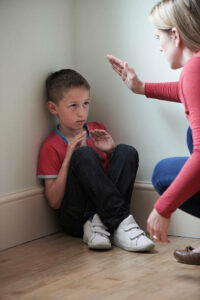High profile campaigners have signed a letter urging the government to end physical punishment against children in England.
 The letter has been signed by a powerful coalition of nearly 300 public figures alongside parliamentarians, academics, health professionals, charities and other organisations.
The letter has been signed by a powerful coalition of nearly 300 public figures alongside parliamentarians, academics, health professionals, charities and other organisations.
They are demanding urgent legislative change, removing the legal right for adults to use “reasonable force” to punish children.
Public figures demand end to physical punishment of children
High profile signatories include Sir Michael Caine, Alan Shearer, Samantha Morton, Natalie Dormer, Michael Gunning, Terri White and Shaniqua Okwok.
 Led by the CEO of the NSPCC, Chris Sherwood, they hand delivered the letter to Number 10 Downing Street, urging Prime Minister Sir Kier Starmer to end the lawful use of physical punishment against children in England – something which has already been implemented in Wales and Scotland.
Led by the CEO of the NSPCC, Chris Sherwood, they hand delivered the letter to Number 10 Downing Street, urging Prime Minister Sir Kier Starmer to end the lawful use of physical punishment against children in England – something which has already been implemented in Wales and Scotland.
Delivery of the letter followed a rally at Westminster, where public figures met with a cross-party group of MPs to explain why they believe legislative change is urgently needed.
It comes as the Children’s Wellbeing and Schools Bill progresses through Parliament, making the timing crucial.
‘Reasonable force’ legal defence is ‘outdated and damaging’
Coordinated by the NSPCC, the letter brands the current legal defence of “reasonable force” as “outdated and damaging,” and argues that it “teaches children that violence ‘corrects’ behaviour and that those closest to them can also be the ones who hurt them.”
Actor Samantha Morton, who is also an NSPCC Ambassador for Childhood, explained:
“Physical punishment of children is never reasonable, and the law in England needs to be changed to address this. It’s vague, it’s harmful and it leaves children less protected than adults.”
Standing outside Downing Street, she called on the government to “protect children and ensure that the law is clear, equal and most of all, keeps every child safe from harm.”
The NSPCC’s CEO Chris Sherwood added:
“With over 65 countries, including Wales and Scotland, already having legislated to protect children from physical punishment, how much longer can England justify waiting?
“The evidence is crystal clear, physical punishment is harmful, ineffective, and damages the trust and wellbeing at the heart of family relationships. The Prime Minister has previously called for England to follow Wales’s lead and remove the outdated defence of ‘reasonable punishment’. Now is his time to act.”
His sentiment was echoed by the Chief Executive of children’s charity Barnardo’s, Lynn Perry, who said:
“[…] At Barnardo’s, we see how important it is for children to develop positive, healthy relationships with the adults around them, and how vital it is for them to feel safe.
“We have a pivotal opportunity now to finally legislate for the change children need and deserve. We’re proud to stand alongside so many leading voices to say it is time for every child to be legally protected from physical punishment.”
Rise in concerns about the physical punishment of children
 The campaign follows an increase in the number of adults contacting the charity’s helpline to report concerns about the physical punishment of children.
The campaign follows an increase in the number of adults contacting the charity’s helpline to report concerns about the physical punishment of children.
New data reveals that, in the 6 months since 1st April 2025, 262 adults contacted the NSPCC Helpline with concerns about children receiving physical punishment. This compares to 184 contacts during the same period last year, representing a 40% rise in concerns of this nature.
The NSPCC says that the campaign to end physical punishment against children is supported by parents, young people and safeguarding professionals.
Physical punishment has been linked to worsening child behaviour problems, and poor child mental health.
Despite this, the current legal defence of ‘reasonable punishment’ in England means that children are not fully protected in law from physical assault, and actually have less protection in this regard than do adults. The Children’s Wellbeing and Schools Bill could change this, but at the moment it doesn’t include this measure.
The NSPCC’s coalition of campaigners have urged the Prime Minister to address this and “stand up for every child’s right to safety, dignity and respect.”
Training to safeguard children
 First Response Training (FRT) is a leading national training provider delivering courses in subjects such as health and safety, first aid, fire safety, manual handling, food safety, mental health, health and social care, safeguarding and more.
First Response Training (FRT) is a leading national training provider delivering courses in subjects such as health and safety, first aid, fire safety, manual handling, food safety, mental health, health and social care, safeguarding and more.
They work with a large number of early years and childcare providers, as well as schools, colleges, and children’s services. Their courses include Safeguarding Children.
A trainer from FRT says:
“All children deserve to be protected from harm and to feel safe at home. It’s vital that anyone who works with children and young people completes Safeguarding training so that they are aware of the signs of physical and other abuse and know the correct action to take if they suspect a child is at risk.”
For more information on the training that FRT can provide, please call them today on freephone 0800 310 2300 or send an e-mail to info@firstresponsetraining.com.
